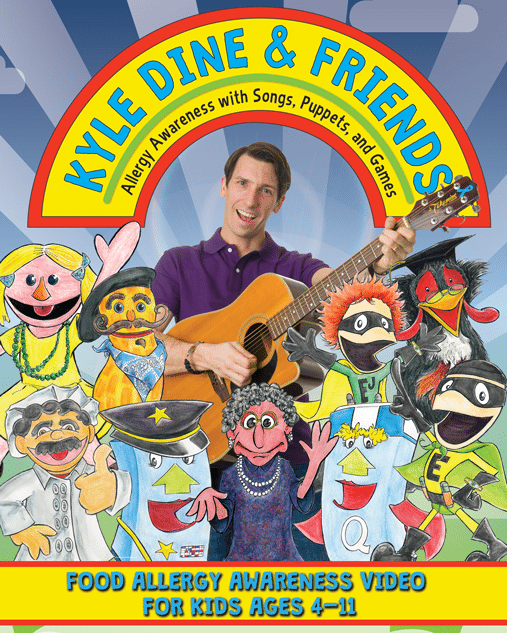 Photo: Getty
Photo: Getty A teen needs to tell a date about allergies. Here’s how to romance and move on to kissing, with only the right kind of reaction.
I’ve known since my son Daniel was 18 months old that a kiss is not just a kiss. I had eaten a granola bar containing nuts while running errands. Arriving back home, I greeted him with a kiss on his chubby little cheek. Hives immediately appeared in the shape of my lips! When they progressed past the area where I kissed him, I got nervous.
Thankfully, after washing with soap and water, the reaction subsided. Now that Daniel is a teenager, concerns about kissing are front and center again. After reviewing the research, I’m convinced these concerns are justified. I’ve read about reactions after eating nuts, peanuts, fish, shellfish, even apple and kiwi. Reactions from kissing are common and can be serious.
According to pediatric allergist Dr. Scott Sicherer, studies show that between 5 and 12 percent of food-allergic individuals will experience a reaction from kissing.
An article published by a Mayo Clinic journal in 2003 details the case of a 20-year-old woman who shared a passionate kiss with her boyfriend who had eaten shrimp an hour before. Her immediate reaction progressed from lip tingling to full-blown anaphylaxis. Luckily, she was treated successfully with epinephrine at the emergency room.
Research published in 2002 in the New England Journal of Medicine on food allergies and kissing reported one boy’s anaphylactic reaction from his mother’s kiss on the cheek after she tasted split pea soup.
Protein, Saliva and Kissing
Individuals in these studies and others related experiencing reactions from kissing even after a partner had brushed their teeth. What’s happening here? Our saliva contains food protein after we eat. In some cases, that residual protein can linger, even after chewing gum or brushing teeth.
A kiss on the cheek may transfer a bit of this protein to the skin, which can then cause an allergic reaction. Usually skin reactions are localized, but in rare cases they can escalate. Kissing on the lips poses more of a risk. In fact, during a passionate French kiss, there is an exchange of saliva along with residual traces of food. (TMI? Sorry, but it’s important to understand what is happening here.)
So how can a person with food allergies kiss safely? The research suggests there are several precautions that can help. Parents, here are a few to share with your teens and tweens.
Avoid allergens altogether
Possibly the best option is if a significant other avoids your allergens completely on dates. This works especially well if you have only one or two allergies, or if it’s an allergen that is easy to avoid.
If you choose not to go deep into food allergies on your first date, you do need to make clear that even gum, candy, alcoholic drinks, lip balm and makeup can contain food ingredients, and may need to be avoided.
Wait about 4 hours
Researchers at New York’s Mount Sinai studied the risk of peanut exposure from the saliva of a partner who had eaten peanut butter. They found that no detectible peanut protein was left almost four hours later and after the partner had eaten a peanut-free meal. This suggests that if an allergen was eaten, you’re best to wait several hours before any canoodling, and have the date eat something. In addition to giving it some time, you’ll be better off if you include some of the precautions below.
Brush, rinse, repeat
Brushing teeth and rinsing thoroughly can help remove food protein. Just remember that brushing immediately after eating an allergen can still leave detectable protein in some individuals. The partner still needs to wait, then re-brush.
Eat freely
Share a safe meal or snack with your date. Eating a non-allergenic meal or snack after the four-hour waiting period was the most effective strategy in reducing allergens in saliva to undetectable levels. Chewing gum may also help, but only if you’ve waited a few hours first.
Tell (then kiss)
To get your date to follow the precautions above, you’ll first need to find a way to talk to him or her about your food allergies. Having a conversation like this may feel awkward, but it will be less awkward than having an allergic reaction after an intimate moment. If someone likes you enough to kiss you, they should be caring enough not to put you at risk.
Once they understand what is needed, it may still take a few reminders on your part, but each discussion should feel a little more comfortable. Then one day when you notice your date passing on the buttered popcorn or the peanut butter candy at the movies, you’ll know that you may have found a keeper.
Gina Clowes is a certified life coach and consultant who helps parents and schools advocate for children with food allergies. She is the founder of AllergyMoms.com, a support community serving thousands worldwide.
The Food Allergy Anxiety Guide: Get Yours Today!
Related:
Single with Food Allergies: Advice on Dating and Relationships
Reader Story: Dating with Allergies: When a Kiss is Not Just a Kiss





